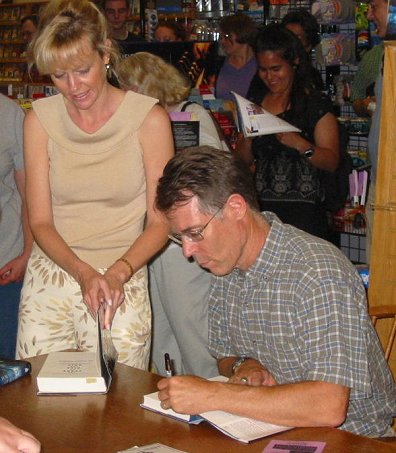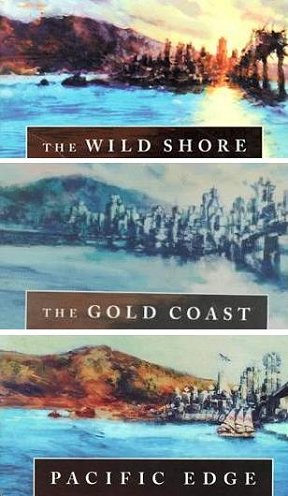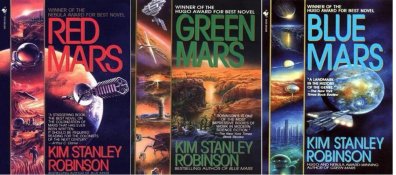

|

I walked into the bookstore with a little time to browse before the signing started. I found a couple of bargains, had a nice conversation with some of the staff working the event, then headed upstairs to find a seat. I had brought a pile of Robinson's books with me, and soon I was comparing editions and trading stories with my fellow enthusiasts. And then it hit me. I was having fun! The stress of the new job and the move, the aggravation of the two-hour drive in the rain - all of this was forgotten. I felt more energetic and more in tune with life than I had in weeks. And this was my epiphany: I like books. Such a simple observation, so simple that it is easy to overlook in the hassle of everyday existence. I had allowed my life to get too hectic, too wrapped up in the daily stress makers. Nearly all of my several thousand books are boxed up - and what a job that was! - and I haven't listed or sold a book in nearly two months. My book scouting, which used to be an almost daily event, has tapered off to nearly nothing. Worst yet, I missed writing last month's column (sorry Craig) and gave serious thought to skipping this one as well. My epiphany wasn't a religious experience to be sure, more like the shock of recognizing something that was right in front of me all the time. Or the experience of putting on a new eyeglass prescription and suddenly remembering just how crisp and clear the world really is. I do like books. I like reading them and owning them. I like the way they look on my shelves and the way they feel in my hands. I also like selling them. Making money at bookselling is no easy task. As the old joke goes, the easiest way to end up with a million dollars selling books is to start with two million. But if making money were the only consideration, none of us would be here. We've all heard the variations: I had too many books and started selling online to lighten the load; I started selling books online so I could buy more books; I always wanted to open a bookstore, and now on the Internet I can. In other words, booksellers do what we do because we like books. I take the time to repeat this simple and obvious truth because, like me, you may have temporarily lost sight of it. With the uncertainty and frustration surrounding the category restructuring at eBay, with making decisions about alternate auction sites versus fixed-price venues, with Amazon versus Alibris versus Abebooks, with penny-sellers dragging the market down ... don't lose sight of what brought you to the table in the first place. The simple fact that you have found your way to the BookThink site, that you find value in Craig's articles (and, I hope, mine) means something. It means that you are willing to put effort into improving your knowledge and skills. It means that you want to push a little harder and dig a little deeper - to be a better bookseller. I realized this about myself last Tuesday night when I suddenly remembered just how much I liked books and book places and book people. Take a moment every so often to remind yourself. And now let's talk about some SF books. Kim Stanley Robinson is one of modern science fiction's finest writers. He is a winner of the Nebula, Hugo (twice), Asimov, John W. Campbell Memorial, Locus and World Fantasy Awards. KSR's 1982 Ph.D. thesis was published as The Novels of Philip K. Dick in 1984, and his first fiction, The Wild Shore, was published as a paperback original in 1984 as part of Terry Carr's legendary Ace Science Fiction Specials series. The latter received a Nebula nomination as Best Novel for 1984. The first hardback edition of The Wild Shore was published in the UK (London: Macdonald, 1986; $50); and in fact, the majority of Robinson's true first editions were published in the UK. The Wild Shore proved to be the first installment in the Three Californias trilogy (also known as the Orange County trilogy), along with The Gold Coast (New York: St. Martins, 1988; $15), and Pacific Edge (London: Unwin Hyman, 1990; $10). Each book in the Three Californias trilogy presents a different view of the same Southern California locale, representing three possible futures. The Wild Shore is a post-holocaust novel set in a rural landscape of small farming and fishing villages peopled by the struggling survivors of a nuclear war. The Gold Coast is a dystopian look at a landscape over-run by suburban sprawl in a world under siege by terrorism - and the business of America is building and exporting weapons (hmm, sounds familiar). And finally, Pacific Edge is an ecotopia (an ecologic utopia) that has often been praised for its "lived-in" realism. At the book signing, Robinson commented that one of the greatest challenges in SF is writing near-future fiction, plausibly mapping out the route that connects it to our present. A strong argument could be made that the books of the Three Californias trilogy roughly parallel the three books of Dante's Divine Comedy - Hell, Purgatory and Paradise.

Icehenge (London: Macdonald, 1986; $25) is a trio (KSR seems to have a thing about threes) of semi-related novellas centered upon a mysterious artifact made of ice slabs found on Pluto. The stories display some of the themes that would later be developed in Robinson's Mars Trilogy (see below), notably a developing Martian colony that seeks independence from Earth. Robinson continued to develop the utopian themes of Pacific Edge in the Mars Trilogy, his most popular and critically successful work to date. These included Red Mars (London: Harper Collins, 1992; $250+ and New York: Bantam Books, 1993; $250+ ... careful, nearly all copies of the Bantam edition you see offered will be book club editions); Green Mars (London: Harper Collins, 1993; $75+ and New York: Bantam Books, 1994; $50+); and Blue Mars (London: Harper Collins, 1996; $25 and New York: Bantam Books, 1996; $10). Red Mars won a Nebula for Best Novel in 1993, while Green Mars and Blue Mars won Hugos for Best Novel in 1994 and 1997 respectively.

A sprawling work chronicling the colonization and terraforming of Mars, this trilogy is a detailed examination of the profound changes humans bring to the planet and the more subtle changes the planet, in return, elicits in the humans living there. Robinson has, with justifiable pride, described the Mars Trilogy as a "genre killer" - a work that so definitively explores its niche that it ruins it for all subsequent authors. I'm tempted to say that the next great book on Mars colonization will have to be the history of the real thing. Note: many people bring red, blue and green pens with them to KSR signings. KSR has also published a short story collection, The Martians (London: Harper Collins, 1999; $10 and NY: Bantam, 1999; $5), set in the Mars Trilogy universe. The Years of Rice and Salt (London: Harper Collins, 2002; $10 and New York: Bantam Books, 2002: $5) explores an alternate history in which the Black Death wipes out more than 95% of the population of Europe. KSR originally conceived this as a short story but quickly shelved it as the scope of the story expanded beyond his knowledge of the subject. He never gave up on the idea and spent over twenty years collecting a library of reference books all with some connection to the Black Death and medieval history. Kim Stanley Robinson is currently (June 2004) on tour promoting his newest book, Forty Signs of Rain, the first installment of the planned Capital Code trilogy. The focus of this new series is a frightening version of global warming that unfolds, not over centuries or even decades, but within just a few years. In typical Robinson fashion, the story develops around a large cast of very human characters caught up in the dynamic between big business, modern politics and hard science. For a full bibliography of KSR's works, take a look at KimStanleyRobbins.net.
< to previous article
to next article >
Questions or comments?
| Forum
| Store
| Publications
| BookLinks
| BookSearch
| BookTopics
| Archives
| Advertise
| AboutUs
| ContactUs
| Search Site
| Site Map
| Google Site Map
Store - Specials
| BookHunt
| BookShelf
| Gold Edition & BookThink's Quarterly Market Report
| DomainsForSale
| BookThinker newsletter - free
Copyright 2003-2011 by BookThink LLC
|

|